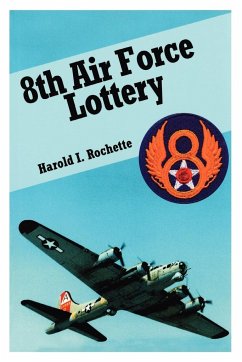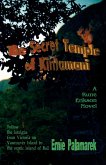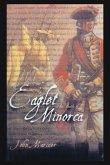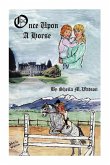Harold I. Rochette
8th Air Force Lottery
Harold I. Rochette
8th Air Force Lottery
- Broschiertes Buch
- Merkliste
- Auf die Merkliste
- Bewerten Bewerten
- Teilen
- Produkt teilen
- Produkterinnerung
- Produkterinnerung
Gripping history written like a novel. Marathon missions that would test one's courage, stamina and perseverance. Hardships that required drugs issued to keep fliers awake. A book to read twice.
Andere Kunden interessierten sich auch für
![The Lottery Winner The Lottery Winner]() Mary Higgins ClarkThe Lottery Winner10,99 €
Mary Higgins ClarkThe Lottery Winner10,99 €![The Find at Ephesus The Find at Ephesus]() Richard GeldardThe Find at Ephesus22,99 €
Richard GeldardThe Find at Ephesus22,99 €![The Secret Temple of Kintamani The Secret Temple of Kintamani]() Ernie PalamarekThe Secret Temple of Kintamani16,99 €
Ernie PalamarekThe Secret Temple of Kintamani16,99 €![The Eaglet at the Battle of Minorca The Eaglet at the Battle of Minorca]() John MarinerThe Eaglet at the Battle of Minorca16,99 €
John MarinerThe Eaglet at the Battle of Minorca16,99 €![Satylea Scrolls Satylea Scrolls]() Dot TaigSatylea Scrolls14,58 €
Dot TaigSatylea Scrolls14,58 €![A Look of Poetry A Look of Poetry]() Connie DowneyA Look of Poetry13,17 €
Connie DowneyA Look of Poetry13,17 €![Once Upon A Horse Once Upon A Horse]() Sheila M WatsonOnce Upon A Horse24,46 €
Sheila M WatsonOnce Upon A Horse24,46 €-
-
-
Gripping history written like a novel. Marathon missions that would test one's courage, stamina and perseverance. Hardships that required drugs issued to keep fliers awake. A book to read twice.
Hinweis: Dieser Artikel kann nur an eine deutsche Lieferadresse ausgeliefert werden.
Hinweis: Dieser Artikel kann nur an eine deutsche Lieferadresse ausgeliefert werden.
Produktdetails
- Produktdetails
- Verlag: Trafford Publishing
- Seitenzahl: 202
- Erscheinungstermin: 8. Juni 2006
- Englisch
- Abmessung: 229mm x 152mm x 13mm
- Gewicht: 336g
- ISBN-13: 9781412076302
- ISBN-10: 1412076307
- Artikelnr.: 21765228
- Verlag: Trafford Publishing
- Seitenzahl: 202
- Erscheinungstermin: 8. Juni 2006
- Englisch
- Abmessung: 229mm x 152mm x 13mm
- Gewicht: 336g
- ISBN-13: 9781412076302
- ISBN-10: 1412076307
- Artikelnr.: 21765228
On the last day of school in the fourth grade, I was thrown out of school. I had hit the teacher, Miss Hughs, in the head with a rubber ball that we were throwing around. It was an accident but it didn't matter, I was out. I couldn't go home, so I spent the rest of that rainy afternoon hiding in an empty chicken coop until the class got out. The rest of my schooling was normal, right through high school. In high school I participated in football, basketball and track - never outstanding, but good enough to play. I also played some semi-pro football and basketball after high school. In my sophomore year I met Doris Stange. We went together until we were married in 1941. As a kid, my first job was weeding onions on a truck farm for ten cents an hour. I progressed to 35 cents an hour on my next job as a gardener and then did a little better as a hauler in the tobacco fields. Other jobs that I held in my youth included soda jerk, door-to-door salesman, store's clerk, painter's helper, and laborer. As a laborer, I once pushed wheelbarrows full of cement for 14 hours, in a boiling sun, and then took Doris to her Senior Ball that night. My next job was at Pratt & Whitney, where I was paid a very good wage and a bonus that sometimes reached well over 100 percent. Pratt & Whitney was a defense factory, but when the United States entered World War II, I decided I wanted to try flying the engines I'd been working on. To accomplish that, I began studying for the examination that would make me an Aviation Cadet. This book covers what happened from then to my time in the active reserve. While I was in the active reserve, I worked for the Connecticut Light and Power Company. Because I wanted to work outside, I took a job as a lineman. When the company needed a head instructor for its new Hot Line Stick Training Program, I was selected because of my background as an instructor in the Air Force. I was given a free hand to set up the school, the tests, and the training area for training more than 600 linemen. Four instructors were assigned to work for me, and I was handed the added assignments as chairman of the newly organized Tool and Equipment Committee and the drafting of Work Practices and Procedures for the Transmission and Distribution Departments. Hot-stick work was entirely new to our whole system. We had used hot sticks right along to pull cutout boxes and switches, but not on the major scale being contemplated. The company sent me out to Centralia, Missouri, where the A.B. Chance Company manufactures its tools. I saw how the hot sticks were made and used and went through a two-week training course. At that time, the sticks were all wood, in some cases with strips laminated and the grain reversed for strength. They were kiln dried to reduce moisture and to cut down on conductivity, then coated with plastic to hold them in that condition. Working with those tools was much like working with your hands, except you were 6 to 10 feet away from the work. The sticks ranged in diameter from 1 1/2 inches to 4 inches and from 3 feet to 14 feet in length. We could do any job with those tools that we could do with our hands, including complete pole changeovers. The sticks were meant to be used on all voltages above rubber-glove range (5,000 volts). While working as a hot-line instructor, I traveled to upstate New York to train with a crew handling 345,000-volt lines, barehanded. It was done from a bucket truck with a grid in the basket and a cage in back and over it. To do it, you clipped in and were part of the circuit. If you were to spit from the bucket, you would get a flash back of electricity to your lip. If you were to roll a cigarette, the tobacco would float in midair, as it would in the weightlessness of outer space. Otherwise, you were like a bird sitting on a wire. I'm sure I was the first and only person in Connecticut to barehand 345,000 volts. Bare-handing is a common everyday occurrence out the








